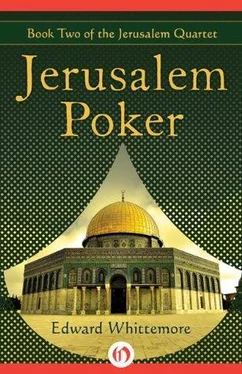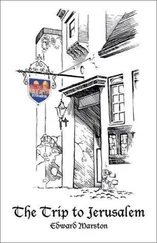From its description Munk recognized the stringed instrument as a koto, the ancient Japanese harp he had heard Colonel Kikuchi play in Constantinople during their rare moments of leisure. As for the collapsible altar in two parts, Munk understood what that was when he saw Rabbi Lotmann returning to the monastery that first evening with a cylindrical red lacquer case slung over his shoulder and a light thin canvas case over six feet long swinging in his hand.
A samurai bow and quiver.
Evidently the former Baron Kikuchi was taking advantage of his stay at the monastery by practicing his archery.
After the evening meal Munk joined the Greek monks in the dark corridor outside of Kikuchi's cell, where they regularly gathered each night to sit on the floor and listen to Kikuchi's exotic music. The selections that evening ranged from sacred Japanese court music to Noh drama. Sitting very erect in a formal kimono with his feet tucked beneath him, Kikuchi announced each piece beforehand to the assembly of totally baffled Greek monks.
The closing selection was especially beautiful to Munk's ear's, a thirteenth-century kagura used for the most solemn Japanese religious rites. Maintaining his disguise, Kikuchi had referred to it as a weird Chinese composition. In any case the Greek monks found it incomprehensible.
At the conclusion of the concert the Greek monks crossed themselves and drifted away. Only then did Munk step forward from the shadows into the doorway of Kikuchi's cell, which was lit by a single candle. He had decided to speak in German so they wouldn't be understood by any monk who might still be lingering in the corridor.
Baron Kikuchi, that was lovely.
Thank you, sir.
And I suspect it may be the strangest music ever heard at St Catherine's.
I suspect you may be right.
Especially the last piece you played. Your weird Chinese composition, as you called it.
Weird, murmured Kikuchi. That's what it is all right.
Because of its semitones?
What?
Yes. In fact there were semitones all evening.
Now I think that's definitely weird, said Kikuchi. But why do you think so?
Because I've been told Chinese scales don't have semitones. Japanese scales do.
Is that so? You mean that although I'm a Chinese pilgrim, my music is Japanese? This is certainly getting weirder all the time. Do you think there could be some sort of divine influence radiating from the holy mountain above us and splitting my tones? Just halving them on the spot, so to speak?
Kikuchi laughed gaily.
Well it's weird all right. Weird. I picked the right word. By the way, where did you learn about Oriental music?
From a friend. A hero of the Russo-Japanese War who saved his company on a barren Manchurian plain by piling up the dead horses of the Cossacks as a barricade against their incessant attacks. Later, I might add, when we were both serving as military attachés in Constantinople, the meat served by the Turks was just as bad as any rotting Cossack horse.
The little Japanese aristocrat jumped to his feet.
Are you Munk, then? My brother often spoke of you.
Kikuchi, delighted, shook hands. Their conversation lasted most of the night and the next morning they went out to walk across the hills together, talking all the while, Kikuchi occasionally pausing to take aim at some distant patch of sand and fire off an arrow.
Gentle in manner and tiny in stature, the present Rabbi Lotmann had been born the hereditary leader of a powerful landowning clan in northern Japan, but both his title and his numerous estates had passed to his younger twin when he embraced a foreign religion. To anyone this would have been a striking testament of faith, but what most impressed Munk was that Kikuchi had then gone on to become a passionate Zionist.
Munk himself, although recognizing the appeal of Zionism to the oppressed Jews of eastern Europe, had never taken any particular interest in it himself. Somehow it had seemed irrelevant in the Empire of the Habsburgs before the war.
Yet here was an aristocrat from an utterly alien land halfway around the world, a rich esthete from a unique ancient culture who had devoted the first thirty-five years of his life to archery and painting, now pacing the foothills of Mt Sinai eagerly quoting Der Judenstaat from memory to prove the absolute necessity of a Jewish homeland.
Munk was astonished. The tiny man's fervor was undeniable, his arguments were entirely persuasive.
Munk found himself being drawn in more and more deeply.
On his third day at the monastery an incident occurred that he would never forget. It was late in the afternoon and the two of them were walking along a lower slope of the mountain, a broad descending sweep of sand. A sharp wind had risen and was buffeting them from the east.
By now Munk was more than a little dazed by their hours and hours of conversation. The wind distracted him and he found himself listening to it. Kikuchi, noticing this, had been silent for some time.
All at once Kikuchi stopped in the middle of the expanse of sand and began tracing Japanese characters with the tip of his bow. He worked quickly, scrambling up and down the slope slashing away at the sand, leaving behind him long columns of intricate curves and crossed lines and softened angles that flowed effortlessly from one complex to the next. When he was finished he came sliding down the slope and stood beside Munk once more, leaning on his bow and smiling up at his handiwork.
It's a cursive script, he said. Not much used anymore, I'm afraid. Difficult even for us to understand.
What does it say? asked Munk dreamily.
Kikuchi laughed.
Several things. At the beginning up there to the right is a haiku, written by a poor poet upon the death of his youngest daughter. He had twelve children and they all died before him, but that little girl was his favorite. It translates, The world of dew is a world of dew, and yet. And yet. Beneath it is the name of a famous Shinto shrine in northern Japan where our ancestral lands are. Up at the top again are some technical terms used in esthetics. Below that the name of the seventh Taoist sage, below that my mother's name, she taught me to play the koto. The next column is breakfast.
Breakfast? said Munk.
Yes, the breakfast my brother and I always ate as boys. Rice and pickles and a certain kind of white fish, grilled, served cold. Lastly, lower down and off to the left, are two signatures. Baron Kikuchi and Rabbi Lotmann. The hillside is me, in short. Watch.
He fitted an arrow to his bow and took aim. The arrow sped up the slope and buried itself deeply in the middle of the swirling characters. Munk stared at the arrow standing there in the sand. After a moment Kikuchi touched him on the sleeve.
Well?
I'm sorry, I must have been lost somewhere. What did you say?
The hillside, Munk. What do you see?
Munk gazed up at it. The wind was blowing away the characters, filling the lines with sand. Already they were mostly obliterated. Only a few dissolving strokes remained here and there. Kikuchi was laughing loudly, tugging at his sleeve.
So quickly and nothing but my arrow is left? What happened to my delicate script? All those beautiful suggestive characters with the myriad meanings and memories they hold for me. Where have they fled?
By the time the former Baron Kikuchi had retrieved his arrow the sandy slope was bare again, swept smooth by the wind. The present Rabbi Lotmann snorted and laughed as they turned back toward the monastery.
When you told me about your great-grandfather, Munk, the one who was an explorer, you implied that some mysterious force had driven him to do so much in only eight years. But I don't think it was mysterious at all. I think he decided he wanted to drive an arrow into the hillside and he did so. Your family remembers that arrow as the love letters he sent to his wife. But as marvelous as they were, and as important as they became to your family, I don't imagine it was exactly that way for him. For him, the pride he took in those eight years was his arrow.
Читать дальше












